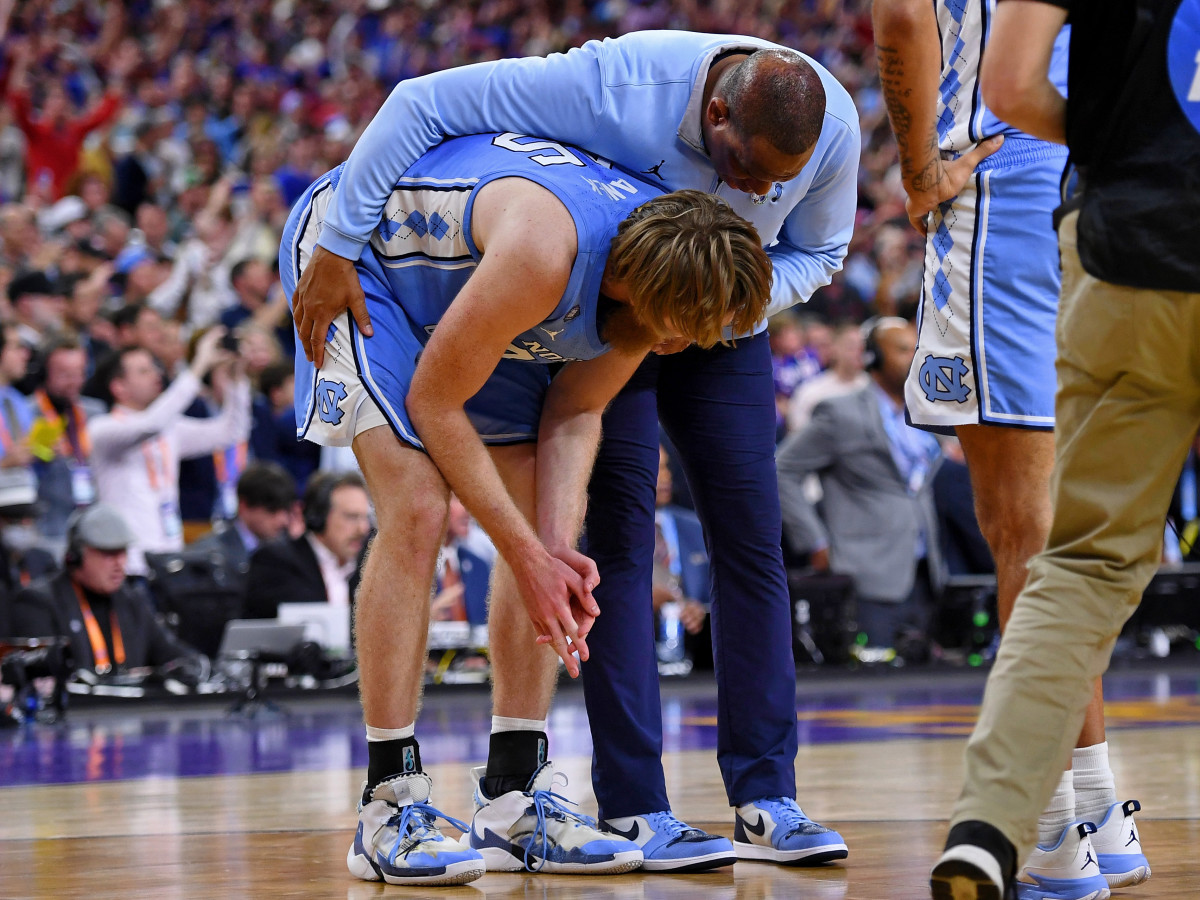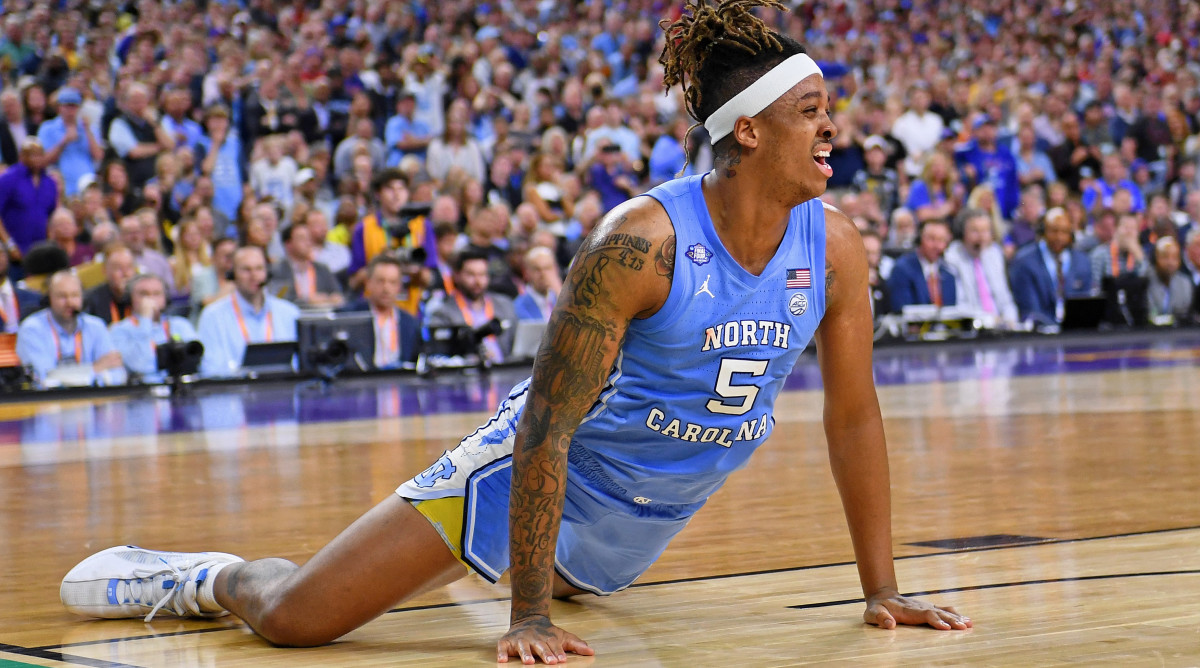North Carolina’s Resolve Pushed to Ultimate Limit in Bruising Championship Loss
NEW ORLEANS — Limping, battered, exhausted, North Carolina kept coming. The Tar Heels were down, they were up—way up—and they were down again. But they refused to submit, unkillable basketball zombies.
Until, in the end, their bodies finally gave out.
Kansas, very good and very lucky in this tournament, prevailed 72–69 to win the national title. It wasn’t over until a Caleb Love three-pointer over Christian Braun went wide left of the rim in the final seconds, hitting the backboard almost precisely where Davidson guard Jason Richards did on the last shot against the Jayhawks in the 2008 Midwest Regional final—the last time Kansas won it all.
The first option on the final play—made possible when Kansas guard Dajuan Harris Jr. inexplicably stepped out of bounds while dribbling with 4.3 seconds left—wasn’t even supposed to be Love. The play design was for Brady Manek to cut down the lane for a baseline screen and flare out to the opposite corner for a three. “I think it would have been open,” said Carolina coach Hubert Davis.
It might have been. But Manek stumbled, nearly falling, staggering toward where he was supposed to be and hurting himself in the process. One more body breaking down at the worst possible time.

Add that to Armando Bacot’s sprained ankle and Love’s rolled ankle, and half of Davis’s six-man rotation wound up being injured. A fourth Tar Heel, sophomore Puff Johnson, threw up on the court after being hit in the stomach. It was a veritable plague.
North Carolina staggered out of the Superdome with the distinction of having the largest lead lost in NCAA championship game history, 16 points in the first half. It also was the first double-digit lead lost by the Heels in NCAA tournament history. Dispiriting as those statistics are, this was really a lost battle of attrition.
Bacot, Carolina’s wrecking-ball center, injured his right ankle late in the epic Saturday semifinal win over Duke. His availability was in doubt for this title game. Bacot said he received treatment on the ankle for about 15 of the 24 hours preceding the title game, but still was playing well short of 100%. That was evident on the jump ball to start the game, when he got no lift off the ground.
“Right before the game I really couldn’t even jump,” Bacot said. “I really couldn’t, the whole game, get the push on my post-ups, defensively, anything. It was just like I kind of was out there and it was just hard for me to really stand my ground.”
Matched up against powerhouse Kansas center David McCormack, Bacot still willed his way to 15 points and 15 rebounds—yet another remarkable performance from a guy who became the first player to record six double doubles in one NCAA tourney. But then he reinjured that right ankle in the final minute with the Jayhawks clinging to a one-point lead.
Bacot drove the ball down the right side of the lane trying to get around McCormack to the basket. “I thought I really got the angle I wanted,” he said. “I thought it would have been an easy basket. And then I just rolled my ankle as I was going up.”
That brutal twist turned out to be the decisive play of the game, although Kansas surprisingly didn’t attack the basket with a five-on-four advantage as Bacot hopped on one foot to get back on defense. After that injury timeout, the Jayhawks did what everyone in the world knew they would do, throwing the ball inside to McCormack as Manek vainly tried to battle him in the post. Outweighed by 20 pounds, Manek stood no chance as McCormack dropped a jump hook over him with 22 seconds left for the final points of the game.
Earlier mishaps took their toll on the Tar Heels as well. Love was hobbling around the court for a while after his rolled ankle. He made just five of 24 shots, unable to conjure the second-half magic he displayed against UCLA in the Sweet 16 and Duke in the Final Four. Manek, who ended the game stumbling, got cold-cocked by McCormack’s elbow in the opening minutes. And Johnson suddenly dropped to the court and vomited with 4:23 left, after a great stretch of play by the backup wingman. (Millions of people watching could identify with throwing up in New Orleans, albeit for different reasons.)
Fatigue likely played a factor as well, as Carolina could not sustain its first-half performance. The legs that weren’t injured certainly were tired. “The shots that we usually make we were missing,” said guard R.J. Davis. “Coming up short.”

The physical and mental effort that went into defeating Duke on Saturday night in a classic game took its toll as expected. This was reminiscent of Wisconsin in the 2015 Final Four, when the Badgers scored an upset of undefeated Kentucky in the semis and then hit the wall against Duke in the second half two days later.
Still, Carolina had its chance at the end. Harris would have gone down in the Fred Brown/Chris Webber New Orleans Title Game Hall of Shame if his unforced turnover had given way to a tying three from the Heels. But that would only have forced overtime, and without Bacot Carolina likely would have been cooked at that point.
Kansas had incredible injury luck throughout this tournament. In the second round it faced a Creighton team that was without point guard Ryan Nembhard and center Ryan Kalkbrenner, the Big East Defensive Player of the Year. In the Final Four it faced Villanova without its top player, guard Justin Moore. And then Carolina’s bodies fell apart Monday night.
Combine that with the best of all fortune: the NCAA failing to finish a major infractions case facing the Jayhawks that dates to the federal investigation of corruption in the sport in 2017. A team winning the national title while under investigation and facing five allegations of major violations is a champion for our times. A Level One Shining Moment, if you will.
This three-point defeat ended an incredible month for North Carolina and its first-year head coach. The Heels rocketed from bubble team in early March to national runner-up a month later, with two epic victories over Duke and an upset of reigning national champion Baylor in between. They were just the fifth No. 8 seed to make the national title game, the first since 2014, and they validated the hiring of Davis after he endured considerable midseason criticism.
Davis was trying to chart a unique path to a championship. Only two coaches have won NCAA tournament titles in their first year as a head coach: Steve Fisher, the interim who was thrust into the job at Michigan in 1989; and Ed Jucker at Cincinnati in ’61. Both were 44 years old at the time and had prior head-coaching experience—Fisher at the high school level, Jucker at a couple of small colleges.
Davis ascended to what is widely regarded as the best coaching job in the country at age 50, after spending just nine seasons in the profession. And although he shared one trait with Fisher and Jucker—all three were trusted assistant coaches at their schools before being promoted—Davis was hardly a lifer in the profession. After a long NBA career, he spent time as a TV analyst at ESPN before joining Roy Williams’s staff in 2012. His sole experience as a head coach was leading North Carolina’s quaint junior varsity team.
For the vast majority of the season, nobody looked at Carolina and envisioned a Final Four team, much less a national champion. But Davis did.
He put pictures of the Caesars Superdome in the players’ lockers in September and got on a Zoom call with their parents to tell them they should book travel to New Orleans. “At the time it was very corny,” said Carolina forward Brady Manek. “It was funny.”
That said: Manek admitted that he still has his Superdome picture in his locker in the Dean Smith Center. Corny, but effective.
Promoted at a bargain-basement annual salary ($1.75 million), Davis is due to get a huge raise. He’s proven himself fully worthy of his dream job.
“I love what I’m doing,” he said. “I just love being the head coach at the University of North Carolina and coaching these kids.”
More March Madness Coverage:
• Historic Comeback Brings Kansas Back to Summit
• Way-Too-Early Men’s Top 25 for 2022–23 Season
• NCAA Releases 2022 One Shining Moment Video
